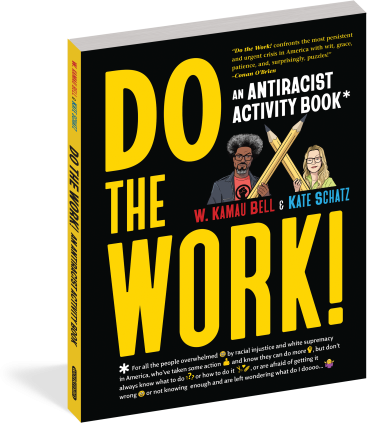January 2023
Do the Work: An Antiracist Activity Book

When activists talk about “white supremacist culture,” many of us aren’t sure what they mean. This month in Deep Dive, Cathy Corman explores the concept as it is used in Do the Work: An Antiracist Activity Book, published this past July. The book is the delightful and funny fruit of a collaboration between comedian and filmmaker W. Kamau Bell and queer feminist activist Kate Schatz.
Bell is a prolific, celebrated comedian and documentary producer. Some may have seen his stand-up or watched his CNN series, United Shades of America. Others will have seen Bell’s four-part series on Showtime, We Need to Talk about Cosby, an examination of the complicated relationship many Blacks have with Bill Cosby.
In Do the Work, Bell and Schatz define white supremacy as “a political and socioeconomic system where white people enjoy structural advantages that other racial and ethnic groups do not.” They write that anyone considered white or who can pass for white can “leverage” the privileges baked into whiteness. Such privileges include wealth; access to health care, education, and housing; and the ability to avoid incarceration and violence at the hands of police.
Where do liberal, progressive, activist members of NCJW fit into these definitions and descriptions? If they’re white, they need to think carefully about the ways they benefit from systems that oppress Black and Indigenous People of Color (BIPOC). If they’re BIPOC Jews, it may well be helpful to know that white Jews are “doing the work” to learn how to be anti-racist.
Bell and Schatz acknowledge that it’s not easy to talk about racism and white supremacy. They write that “[w]e get defensive and awkward, angry and indignant. We feel blamed and guilty. […] [W]e often make ourselves the victim.” Worse, they write, “we’re raised to think it’s rude to even mention race, that the opposite of being racist is being ‘color blind.’”
Talking about the ways we are implicated in a system that combines prejudice and power is the first step to dismantling the system, they write. Then there is activism, which might range from putting an “End White Supremacy” sign on one’s front door to attending local government meetings to advocating for the end to racist policies concerning policing or pay.
Those well-acquainted with Bell’s wisdom and wit won’t be surprised to find his insights and humor in full force in the workbook. After they’ve laid out these concepts, Bell and Schatz offer a variety of activities, such as a “coloring break” of Black singer and activist Nina Simone at the keyboard, a “white supremacy word scramble,” and a series of pop-up pages focusing on microaggressions.
The beauty of such seemingly ridiculous and nonetheless instructive activities is that they allow folks like us progressive NCJW MA members who are also white to begin to “do the work” to dismantle white supremacist culture.
And yes, Do the Work really is a workbook. There are chapters with quizzes on the roots of racism in U.S. history. There’s a “check your privilege” inventory so that readers can evaluate how fully they participate in white supremacist culture. (Do you feel mildly annoyed by parking tickets? Are you offended by the term ‘Karen?’ Did you take “a selfie with a cop storming the US Capitol?”) There are opportunities to research on the internet and fill out an “anti-racist contract.” But then readers can take a break and cut out paper dolls. Of course, the dolls are getting ready to join a protest against white supremacist culture. It’s up to readers to make sure the dolls have the right gear.
***

